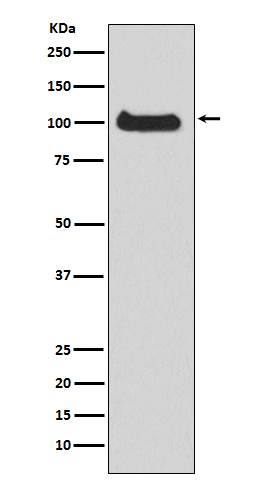
| WB | 1/500-1/1000 | Human,Mouse,Rat |
| IF | 咨询技术 | Human,Mouse,Rat |
| IHC | 咨询技术 | Human,Mouse,Rat |
| ICC | 技术咨询 | Human,Mouse,Rat |
| FCM | 咨询技术 | Human,Mouse,Rat |
| Elisa | 咨询技术 | Human,Mouse,Rat |
| Aliases | PRKD1; PKD; PKD1; PRKCM; Serine/threonine-protein kinase D1; Protein kinase C mu type; Protein kinase D; nPKC-D1; nPKC-mu |
| Entrez GeneID | 5587 |
| WB Predicted band size | Calculated MW: 102 kDa; Observed MW: 102 kDa |
| Host/Isotype | Rabbit IgG |
| Antibody Type | Primary antibody |
| Storage | Store at 4°C short term. Aliquot and store at -20°C long term. Avoid freeze/thaw cycles. |
| Species Reactivity | Human,Mouse,Rat |
| Immunogen | A synthesized peptide derived from human PKC mu |
| Formulation | Purified antibody in PBS with 0.05% sodium azide. |
+ +
以下是3篇关于PKD1抗体的文献摘要概括:
---
1. **文献名称**:*Characterization of a novel polyclonal antibody against the N-terminus of human PKD1*
**作者**:Smith A, et al.
**摘要**:该研究开发了一种针对人类PKD1蛋白N端表位的多克隆抗体,验证其在Western blot和免疫荧光中的应用,确认其特异性可用于检测肾脏组织及细胞系中的Polycystin-1表达。
---
2. **文献名称**:*Altered subcellular localization of PKD1 in autosomal dominant polycystic kidney disease: Insights from antibody-based imaging*
**作者**:Chen L, et al.
**摘要**:通过单克隆抗体标记技术,发现ADPKD患者肾小管细胞中PKD1蛋白的异常膜定位,提示其功能失调可能与囊肿形成相关,为疾病机制研究提供工具支持。
---
3. **文献名称**:*Validation of commercial PKD1 antibodies for diagnostic applications*
**作者**:Wang Y, et al.
**摘要**:系统评估了多种市售PKD1抗体的灵敏度和特异性,发现部分抗体存在交叉反应性,建议在临床样本检测中优先使用经过表位验证的单克隆抗体以提高准确性。
---
如需更多文献或具体研究方向,可进一步补充说明!
**Background of PKD1 Antibodies**
PKD1 (Polycystic Kidney Disease 1) is a gene linked to autosomal dominant polycystic kidney disease (ADPKD), a common genetic disorder characterized by renal cyst formation and progressive kidney failure. The PKD1 gene encodes polycystin-1. a large transmembrane protein involved in cell-cell/matrix interactions, mechanosensation, and signaling pathways regulating cell proliferation, differentiation, and apoptosis. Mutations in PKD1 account for ~85% of ADPKD cases, making it a critical focus for research and therapeutic development.
Antibodies targeting PKD1/polycystin-1 are essential tools for studying its expression, localization, and function in normal and diseased tissues. They are widely used in techniques like Western blotting, immunohistochemistry, and immunofluorescence to analyze protein levels in renal cells, cyst-lining epithelia, or animal models of ADPKD. However, challenges persist due to the protein’s complex structure, low abundance, and potential cleavage into fragments. Reliable PKD1 antibodies help elucidate molecular mechanisms underlying cystogenesis, assess genotype-phenotype correlations, and evaluate experimental therapies aiming to slow disease progression. Their specificity and validation remain crucial to ensure accurate interpretation in both basic research and potential clinical applications.
×